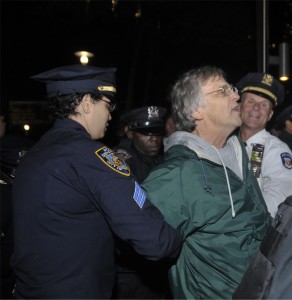By Ellen Davidson
The second day of the trial of fourteen veterans and their allies arrested at New York City’s Vietnam Veterans Memorial Plaza last October ended with a motion by the defense to dismiss the charges on First Amendment grounds.
The defendants were among 25 arrested Oct. 7, 2012, while reading the names of soldiers killed in Vietnam, Afghanistan, and Iraq and laying flowers in 11 vases to mark 11 years of war in Afghanistan. They were charged with trespassing for being in the park after its 10 pm closing time. Ten of the original defendants accepted pleas of Adjournment in Contemplation of Dismissal (ACD, essentially a period of six months probation after which charges are expunged if no other arrests occur), and charges against a livestreamer were dropped July 8 in the interests of justice.
The remaining defendants in the trial are using the case to challenge the increasing restrictions placed by the New York Police Department on First Amendment freedoms of speech and assembly. Their trial will hinge on whether their constitutional and international human rights to speech and assembly may be superceded by municipal park regulations.
Dr. Margaret Flowers, one of the arrestees, explained her participation this way: “We are watching our First Amendment rights recede into a deep darkness, to a place where those who speak out could be detained indefinitely without trial and tortured. We see the day when dissent becomes impossible and we know that the only way to keep our rights is to challenge the system while we still can.”
Vietnam Veterans Memorial Plaza consists of an open space bounded only by the neighboring buildings to the east and west and Water and South Streets to the north and south. It is normally used as a thoroughfare at all hours by workers in nearby offices, dogwalkers, tourists, joggers, and others. Normally there is no enforcement of the 10 pm curfew, but on two occasions–last Oct. 7 and May 1, 2012, following a general assembly after a large march by unions and Occupy Wall Street–police arrested activists on the site.
The trial for the Oct. 7 arrestees began July 8, and the prosecution rested its case July 9 after a day and a half of sometimes contradictory testimony by police and park officials regarding the actual boundaries of the park itself, the location and content of posted signs regarding the opening and closing times and the regulations governing the section of the plaza that is not park property.
The defense, consisting of five volunteer lawyers from the New York City National Lawyers Guild, then submitted a motion for dismissal, saying the prosecution had failed to prove an overriding government interest in closing the park that would supercede the First Amendment rights of those arrested. Citing, among others, a case in which charges were dismissed against Occupy protesters arrested in Chicago’s Grant Park after closing, defense attorney Jonathan Wallace asserted that as soon as the question of protected First Amendment activity comes into play, the government is required to meet rigorous standards in showing why it is necessary to close the park and deny people’s right to assemble and speak. He said that vague assertions by Captain Nicole Papamichael of the First Precinct that post-10 pm parkgoers could become crime victims did not pass this test.
Judge Robert Mandelbaum engaged in an hour-long back-and-forth with Wallace regarding whether a dismissal on First Amendment grounds would entail throwing out all city park closing times whenever people wanted to engage in First Amendment activity. Wallace responded that each park was different and the burden of proof of government interest in closing would depend on the specifics of each situation.
Tomorrow, Judge Mandelbaum will continue his consideration of this issue, as well as questions around application of international law regarding denial of free speech. If he does not dismiss the charges, the trial will continue with testimony from defense witnesses.
The case is expected to continue at least two more days. Supporters are welcome to attend: court begins at 9:30 am at 100 Centre Street, Room 535, in Manhattan.
Story in July 9 New York Post
Story in July 9 Daily News
Story on Daily Kos

